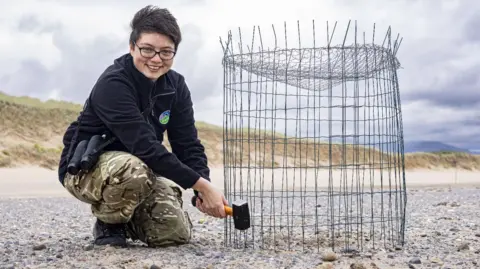Beach cages to help protect threatened birds
 RSPB Images
RSPB Images Bird cages are being placed along beaches to help protect a threatened bird.
The Royal Society for the Protection of Birds (RSPB) and Natural England are working together to install the cages along the coast in Cumbria to protect ringed plovers.
The birds are red listed, meaning they have special protection, and the project was set up in response to the growing number of "failed nests", the RSPB said.
RSPB conservationist Steph Leow said only five out of 30 breeding pairs of ringed plover on a three-mile stretch of coast had managed to hatch chicks, and only two had got chicks to a fledgling stage.
It "gives you an idea of how much they need our help," she added.
She has been putting up signage and installing wire nest cages during the breeding season along Sellafield, Seascale and Drigg beaches as part of a trial to prevent nests being predated.
 LeslieCater
LeslieCaterRinged plovers are small birds which can be spotted around shingle beaches, where they nest between April and August.
The birds have seen a 37% UK population decline since 1984, the RSPB said.
The charity added it wanted to encourage people to keep away from the cages when they spotted them on the beach.
Ms Leow said: "We’ve had a brilliant public response so far and we’re also grateful to the various landowners and local councils for their support.
"We have a long way to go, and we likely won’t see results this year, but people are responding to help and that will hopefully lead to an increase in chick survival rates next year."
Follow BBC Cumbria on X (formerly Twitter), Facebook and Instagram. Send your story ideas to [email protected].
